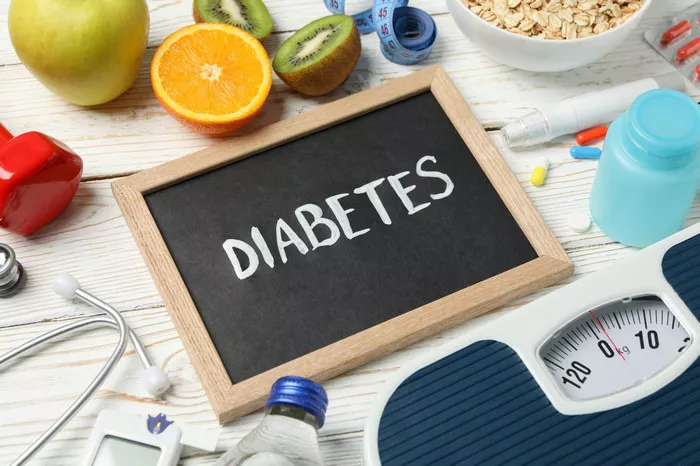Diabetes mellitus is a chronic medical condition characterized by elevated levels of blood glucose (sugar) due to the body’s inability to produce or effectively use insulin. It is a complex and multifactorial disease with various causes, ranging from genetic predispositions to lifestyle factors. This article aims to provide an in-depth understanding of the factors that contribute to the development of diabetes, focusing on both Type 1 and Type 2 diabetes.
Understanding Diabetes
Diabetes is classified into several types, with Type 1 and Type 2 diabetes being the most prevalent. Each type has distinct causes and mechanisms, although they share the common feature of impaired glucose regulation.
Type 1 Diabetes
Type 1 diabetes, also known as insulin-dependent diabetes, typically manifests in childhood or adolescence but can occur at any age. It is an autoimmune condition in which the body’s immune system attacks and destroys the insulin-producing beta cells in the pancreas. As a result, individuals with Type 1 diabetes require lifelong insulin therapy to manage their blood glucose levels.
Type 2 Diabetes
Type 2 diabetes, also known as non-insulin-dependent diabetes, is more common and primarily affects adults, although its incidence is increasing in younger populations. It is characterized by insulin resistance, where the body’s cells do not respond effectively to insulin, and impaired insulin secretion. Lifestyle factors, such as diet and physical activity, play a significant role in the development and progression of Type 2 diabetes.
Causes of Type 1 Diabetes
Type 1 diabetes is primarily an autoimmune condition, but its exact cause is not fully understood. However, several factors are known to contribute to its development:
Genetic Predisposition
Family History: A family history of Type 1 diabetes increases the risk of developing the condition. Specific genetic markers, such as the HLA-DR and HLA-DQ genes, are associated with a higher susceptibility to autoimmune reactions against the pancreas.
Genetic Variants: Certain genetic variants, including those in the INS gene (which encodes insulin) and the PTPN22 gene (involved in immune regulation), have been linked to an increased risk of Type 1 diabetes.
Environmental Triggers
Viral Infections: Exposure to certain viral infections, such as enteroviruses, coxsackieviruses, and rubella, may trigger an autoimmune response in genetically predisposed individuals, leading to the destruction of beta cells.
Early Childhood Diet: Some studies suggest that early introduction of cow’s milk or gluten in the diet of infants may increase the risk of developing Type 1 diabetes, although the evidence is not conclusive.
Geographical Factors: The incidence of Type 1 diabetes varies by region, with higher rates observed in northern Europe and lower rates in Asia. This geographical variation suggests that environmental factors, such as sunlight exposure and vitamin D levels, may play a role.
Autoimmune Mechanisms
Autoantibodies: Individuals with Type 1 diabetes often have autoantibodies that target pancreatic beta cells. These autoantibodies can be detected years before the onset of clinical symptoms, indicating an ongoing autoimmune process.
T-Cell Mediated Destruction: The immune system’s T-cells, which normally protect against infections, mistakenly attack and destroy the insulin-producing beta cells in the pancreas. This immune-mediated destruction is central to the development of Type 1 diabetes.
Causes of Type 2 Diabetes
Type 2 diabetes is influenced by a combination of genetic, lifestyle, and environmental factors. Unlike Type 1 diabetes, which is primarily autoimmune, Type 2 diabetes is closely linked to insulin resistance and beta cell dysfunction.
Genetic Factors
Family History: A strong family history of Type 2 diabetes significantly increases the risk of developing the condition. Several genes associated with glucose metabolism and insulin signaling have been identified, including the TCF7L2, PPARG, and FTO genes.
Ethnicity: Certain ethnic groups, such as African Americans, Hispanics, Native Americans, and Asians, have a higher predisposition to Type 2 diabetes. Genetic variations and differences in lifestyle factors contribute to this increased risk.
Lifestyle Factors
Diet: A diet high in refined carbohydrates, sugars, and unhealthy fats contributes to obesity and insulin resistance. Processed foods, sugary beverages, and a lack of fiber are particularly detrimental to metabolic health.
Physical Inactivity: Sedentary behavior and lack of regular physical activity are major risk factors for Type 2 diabetes. Exercise helps improve insulin sensitivity and aids in maintaining a healthy weight.
Obesity: Excess body weight, particularly central obesity (accumulation of fat around the abdomen), is strongly associated with insulin resistance. Adipose tissue secretes inflammatory cytokines that interfere with insulin signaling.
Smoking and Alcohol Consumption: Smoking and excessive alcohol intake can contribute to insulin resistance and increase the risk of developing Type 2 diabetes.
Environmental Factors
Urbanization and Socioeconomic Status: Urban environments with easy access to processed foods and limited opportunities for physical activity contribute to the rising incidence of Type 2 diabetes. Lower socioeconomic status is also linked to higher diabetes risk due to limited access to healthy foods and healthcare.
Stress: Chronic stress can lead to hormonal imbalances that affect insulin sensitivity and glucose metabolism. Stress-induced behaviors, such as overeating and physical inactivity, further exacerbate the risk.
Insulin Resistance and Beta Cell Dysfunction
Insulin Resistance: Insulin resistance occurs when the body’s cells become less responsive to the action of insulin. The pancreas compensates by producing more insulin, but over time, this compensatory mechanism fails, leading to elevated blood glucose levels.
Beta Cell Dysfunction: In individuals with Type 2 diabetes, the insulin-producing beta cells in the pancreas become dysfunctional and fail to produce sufficient insulin. This beta cell dysfunction is a key factor in the progression from insulin resistance to diabetes.
Other Contributing Factors
Both Type 1 and Type 2 diabetes can be influenced by additional factors that affect overall metabolic health and glucose regulation.
Hormonal Disorders
Polycystic Ovary Syndrome (PCOS): PCOS is a hormonal disorder that affects women and is associated with insulin resistance and an increased risk of developing Type 2 diabetes.
Cushing’s Syndrome: This condition involves excessive production of cortisol, a hormone that increases blood glucose levels and can lead to insulin resistance.
Hypothyroidism: An underactive thyroid gland can slow metabolism and contribute to weight gain and insulin resistance.
Medications
Glucocorticoids: Long-term use of glucocorticoid medications, such as prednisone, can induce insulin resistance and elevate blood glucose levels.
Antipsychotics: Certain antipsychotic medications can lead to weight gain and metabolic disturbances, increasing the risk of diabetes.
Pregnancy
Gestational Diabetes: Some women develop gestational diabetes during pregnancy due to hormonal changes that affect insulin sensitivity. This condition increases the risk of developing Type 2 diabetes later in life.
Preventing Diabetes
While genetic factors cannot be altered, many lifestyle and environmental factors that contribute to diabetes are modifiable. Preventive measures include:
Healthy Diet: Consuming a balanced diet rich in whole grains, fruits, vegetables, lean proteins, and healthy fats helps maintain stable blood glucose levels and supports overall metabolic health.
Regular Physical Activity: Engaging in regular exercise, such as aerobic activities, strength training, and flexibility exercises, improves insulin sensitivity and aids in weight management.
Weight Management: Achieving and maintaining a healthy weight through diet and exercise reduces the risk of insulin resistance and Type 2 diabetes.
Avoiding Smoking and Limiting Alcohol: Refraining from smoking and moderating alcohol consumption can improve metabolic health and lower the risk of diabetes.
Stress Management: Practicing stress-reduction techniques, such as mindfulness, yoga, and meditation, can help regulate hormonal balance and support healthy glucose metabolism.
Regular Health Check-Ups: Routine medical check-ups and screenings for blood glucose levels, blood pressure, and cholesterol can help detect early signs of diabetes and enable timely intervention.
See also: What are the Three P’s of Diabetes
Conclusion
Diabetes is a complex and multifactorial condition with distinct causes and mechanisms for Type 1 and Type 2 diabetes. While genetic predisposition plays a significant role in both types, environmental and lifestyle factors are crucial contributors to the development of Type 2 diabetes. Understanding the causes of diabetes and implementing preventive measures can help reduce the incidence of this chronic disease and promote better health outcomes.
By adopting a healthy lifestyle, managing risk factors, and seeking regular medical care, individuals can significantly reduce their risk of developing diabetes and its associated complications. Through education and proactive management, it is possible to combat the global diabetes epidemic and improve the quality of life for those at risk.
Related topics:
5 Signs That Blood Sugar Is Too High



























